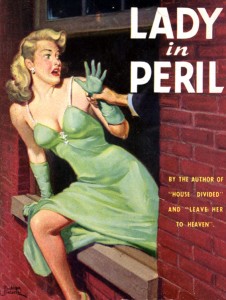 A man inside his car at a gas station is shot point blank by a motorcyclist wearing a opaque helmet who then speeds off. After some detective work, they realize the dead man was friends with a former beauty queen, wife of a wealthy prominent restaurant owner. A mother with 9 children–two adopted. And when about to be questioned about this friendship, the husband and wife clam up, get lawyers, and lay low. The police have no notion as to why, for a very long time. The trail from the victim leads to another ‘friend’ of the beauty queen, and the theory becomes that this killer was having an affair with Ms. Beauty–but so was the victim. So both victim and killer have pretty lady in common, she and her husband are not talking, but facts start pouring out anyway. Turns out, the mother of 9 also had a child from the victim, during their affair. Something she didn’t want publicly known, for obvious reasons. Yet, her other lover, kills the father of this child–why? Why would he care? Well, he’s arrested, all his stupidity in leaving so much evidence behind convicts him of the crime, without his implicating Queenie. The police have no concrete evidence she was involved, but everyone KNOWS she was. Finally, letters between her and the prisoner are found, and she goes on trial for planning the cold blooded killing which in the end did exactly what she didn’t want–all her dirty laundry was on display.
A man inside his car at a gas station is shot point blank by a motorcyclist wearing a opaque helmet who then speeds off. After some detective work, they realize the dead man was friends with a former beauty queen, wife of a wealthy prominent restaurant owner. A mother with 9 children–two adopted. And when about to be questioned about this friendship, the husband and wife clam up, get lawyers, and lay low. The police have no notion as to why, for a very long time. The trail from the victim leads to another ‘friend’ of the beauty queen, and the theory becomes that this killer was having an affair with Ms. Beauty–but so was the victim. So both victim and killer have pretty lady in common, she and her husband are not talking, but facts start pouring out anyway. Turns out, the mother of 9 also had a child from the victim, during their affair. Something she didn’t want publicly known, for obvious reasons. Yet, her other lover, kills the father of this child–why? Why would he care? Well, he’s arrested, all his stupidity in leaving so much evidence behind convicts him of the crime, without his implicating Queenie. The police have no concrete evidence she was involved, but everyone KNOWS she was. Finally, letters between her and the prisoner are found, and she goes on trial for planning the cold blooded killing which in the end did exactly what she didn’t want–all her dirty laundry was on display.
A teenage boy sneaks out of his house one night to meet up with his two best friends from childhood to watch a rare comet in the sky, and is never seen again. The friends are questioned extensively, they didn’t see him, they waited at their ‘clubhouse’ in the woods, but he never showed. The police scour neighboring areas, dogs are sent out, volunteers are used to walk the nearby woods, including the two best friends. Theories come and go–the step father is questioned, his brother who was the last to see him, tells how he went out the window, cars are checked for possible damage in case one hit him and took off, leaving him in the ditch somewhere along the road. Months pass. Years pass. No sign, no indication of anything. The case is cold cold cold. Then out of the blue, a man in his own driveway is gunned down just so someone can steal his car–that someone turns out to be one of the missing boys’ former pals, the friend who was waiting in the woods. He admits to killing the man for his car, but when questioned about the missing kid yet again, he still sticks to his story, and the police figure he wasn’t involved because why lie at this point?
Even more years pass, and a new detective decides to look over old cases and focuses on the missing kid’s case. He re-interviews the remaining suspects, goes over the road where the boy was supposed to be, and rereads the statements very carefully. And that’s where he spots something that is off. The other pal of the missing kid made a statement that he and his buddy hung out, saw the comet, and then went home ‘straight to bed.’ This struck the detective as an odd statement–no teen ever ‘goes straight to bed’, or more importantly, would use that kind of phrase. He  feels it’s the kind of statement one would rehearse if they wanted to make sure they had an alibi. He tracks down the boy’s former friend, and finds him living in the city. He begins by casually chatting with him about his lost friend, and when he notices a nervous reaction pushes on with the pathetic picture of a mother never knowing what happened to her child, the torture she must feel etc. The guy breaks down and admits he and the other best friend, the one who cold bloodedly shot a man, killed and buried the long missing youth. He takes the detective to the area of their clubhouse, explains how it went down, and then leads the police to the spot where the disemboweled body was covered with brush all those years ago. Barely anything is left of the body, but the police totally believe they have the solution.
feels it’s the kind of statement one would rehearse if they wanted to make sure they had an alibi. He tracks down the boy’s former friend, and finds him living in the city. He begins by casually chatting with him about his lost friend, and when he notices a nervous reaction pushes on with the pathetic picture of a mother never knowing what happened to her child, the torture she must feel etc. The guy breaks down and admits he and the other best friend, the one who cold bloodedly shot a man, killed and buried the long missing youth. He takes the detective to the area of their clubhouse, explains how it went down, and then leads the police to the spot where the disemboweled body was covered with brush all those years ago. Barely anything is left of the body, but the police totally believe they have the solution.
So, why? Why would two best friends from childhood brutally kill the third? They planned it. They decided to pay back the kid for taking a small bag of pot from one of them–that’s it–a small bag of pot–for that they bludgeoned their best friend to death and then weeped with the family and spent years knowing what they had done.
An FBI agent has horrific heart disease and needs a transplant. Which, luckily, he gets. He’s taking it easy when a friend’s sister is shot in the head and her heart is transplanted into anothers. A tragedy, but it happens. But not multiple times over a short span of time–and not when the people who are taken out, still have viable beating hearts that are transplanted into those who are sick. And not when after investigation, it turns out that the list of people needing heart transplants is going down quickly, due to so many surprisingly finding matches. As a recipient himself, he feels especially close to this investigation, realizing that the motive of the killer is to reach a specific person in need of a transplant on the list–something that may not have happened in time for the sick individual.
So which of these three scenarios is fiction? They are all rather far fetched. Especially the reason for killing a friend–over a bag of pot. But, having two affairs, delivering a child during one, yet still having a husband who defends you, is really out there. And the whole body part thing is pretty science fiction, isn’t it?
For some reason I’ve taken to watching a channel that shows nothing but true crime re-enactments. I don’t really enjoy real death. I like my mysteries tied up in nice little bows when the page says, the end. Real life doesn’t give you that. Many times it doesn’t even find the murderer–and even more times murders go by and no one even suspects there has been one, and if they do, there is absolutely no way to prove it beyond a reasonable doubt, that prickly little problem most prosecutors have to overcome.
 A man sweeps an ordinary home town girl off her feet, makes her elope, has her move not once but twice, the second time to Alaska, for god’s sake, and demands she help him in his scheme to defraud an insurance company by faking his own death. He has 500 thousand bucks in insurance on himself and 500, 000 on his new wife, AND he demanded she change a life insurance policy she took out with her parents as beneficiaries–to him–another 60,000. She backs out of the fraud scheme, and during a kayak accident, she is thrown overboard, along with her husband. He manages to get back in the kayak, but she is stuck in the water for a long time, as he slowly pulls her to shore. The next day she falls to her death from a cliff.
A man sweeps an ordinary home town girl off her feet, makes her elope, has her move not once but twice, the second time to Alaska, for god’s sake, and demands she help him in his scheme to defraud an insurance company by faking his own death. He has 500 thousand bucks in insurance on himself and 500, 000 on his new wife, AND he demanded she change a life insurance policy she took out with her parents as beneficiaries–to him–another 60,000. She backs out of the fraud scheme, and during a kayak accident, she is thrown overboard, along with her husband. He manages to get back in the kayak, but she is stuck in the water for a long time, as he slowly pulls her to shore. The next day she falls to her death from a cliff.
What a tragedy, right? A state trooper who came upon the panicky husband right after her fall, doesn’t think it was such an accident–and spends his own time for years, trying to find evidence to prove it. There is testimony from the husband’s former friends, from the insurance agencies who tell of him calling their offices over and over again during a few months period, wanting to know if the policies have gone into effect yet, and the day after his wife’s sudden death, calls again, but neglects to mention the passing of his loved one. His wife’s family is convinced he pushed her–because the bride had a great fear of falling all of her life, and would never have ventured near a cliff–not even if in the road far from the edge.
All of this evidence didn’t matter–because the jury felt he wasn’t guilty beyond a reasonable doubt. He got off. Without being able to collect a cent of the insurance, though. A perfect example of how so many people get away with murder in real life–never in fiction.
So what’s my point? I’m not sure I have one, except that I never believed that old adage that truth is stranger than fiction until non stop viewing of bizarre incomprehensible murders on TV that rival any and all good fiction writers.
I’m sure you guessed correctly which of the three is fiction. It’s pretty obvious, right?

I’m horrible at guessing this sort of thing! But nevertheless I’ll go out on a limb and guess that the heart transplant story is fiction….
You win the prize! That was the only fiction book I could think of when I was writing this, lol, how pathetic. But my brain was so focused on these bizarre murders, that fiction flew out!
Bloodwork, by Michael Connelly–and I’m not eve certain I have the plot points correct. It’s a fantastic read, all of Connelly is. Thanks for playing, Nancy, LOL!!
Yay, I won! haha!! It sounded like a Robin Cook medical thriller, not a Connelly book. I have read several of Connelly’s Det. Harry Bosch books and liked them; now I’ll look for this one. (Oh, it isn’t a Bosch book, I just discovered it’s the first in the Terry McCaleb series.)
Great article! I’m very interested in the controversy regarding memoir v. fiction v. nonfiction/reporting.
A book that might interest you is Herta B. Feely’s “Confessions: Fact or Fiction?” as it is an anthology of different authors’ works meant to challenge reader expectations regarding genre and truth.
http://confessionsanthology.com/